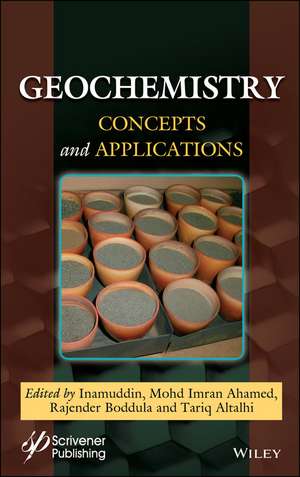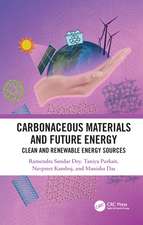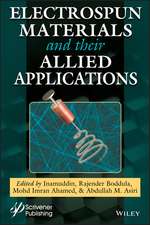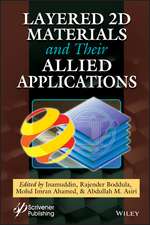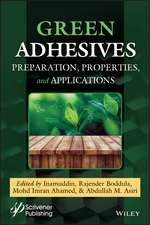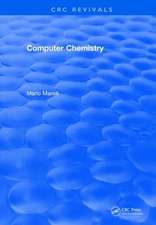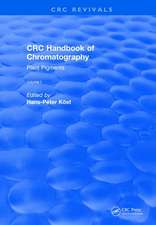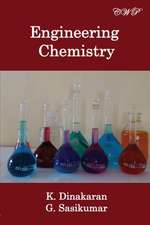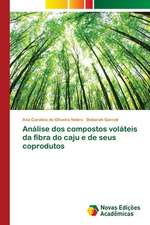Geochemistry – Concepts and Applications
Autor I Inamuddinen Limba Engleză Hardback – 12 apr 2021
Preț: 1101.04 lei
Preț vechi: 1209.94 lei
-9% Nou
Puncte Express: 1652
Preț estimativ în valută:
210.71€ • 215.79$ • 175.28£
210.71€ • 215.79$ • 175.28£
Carte tipărită la comandă
Livrare economică 18 martie-01 aprilie
Preluare comenzi: 021 569.72.76
Specificații
ISBN-13: 9781119709978
ISBN-10: 1119709970
Pagini: 208
Dimensiuni: 162 x 231 x 16 mm
Greutate: 0.44 kg
Editura: Wiley
Locul publicării:Hoboken, United States
ISBN-10: 1119709970
Pagini: 208
Dimensiuni: 162 x 231 x 16 mm
Greutate: 0.44 kg
Editura: Wiley
Locul publicării:Hoboken, United States
Cuprins
Preface xiii
1 Toxic Geogenic Contaminants in Serpentinitic Geological Systems: Occurrence, Behavior, Exposure Pathways, and Human Health Risks 1
Willis Gwenzi
1.1 Introduction 2
1.2 Serpentinitic Geological Systems 4
1.2.1 Nature, Occurrence, and Geochemistry 4
1.2.2 Occurrence and Behavior of Toxic Contaminants 5
1.2.2.1 Chrysotile Asbestos 5
1.2.2.2 Toxic Metals 5
1.2.2.3 Rare Earth Elements 6
1.3 Human Exposure Pathways 7
1.3.1 Occupational Exposure 7
1.3.2 Non-Occupational Exposure Routes 7
1.3.2.1 Inhalation of Contaminated Particulates 7
1.3.2.2 Ingestion of Contaminated Geophagic Earths 8
1.3.2.3 Ingestion of Contaminated Drinking Water 8
1.3.2.4 Ingestion of Contaminated Medicinal Plants 8
1.3.2.5 Ingestion of Contaminated Wild Foods 9
1.4 Human Health Risks and Their Mitigation 10
1.4.1 Health Risks 10
1.4.1.1 Chrysotile Asbestos 10
1.4.1.2 Toxic Metals 11
1.4.1.3 Rare Earth Elements 11
1.4.2 Mitigating Human Exposure and Health Risks 12
1.4.2.1 Risk Analysis 12
1.4.2.2 Risk Evaluation 12
1.4.2.3 Risk Mitigation 13
1.4.2.4 Overview of Mitigation Interventions 13
1.5 Future Perspectives 13
1.6 Conclusions 14
Acknowledgements 15
References 15
2 Benefits of Geochemistry and Its Impact on Human Health 23
Abel Inobeme, Charles Oluwaseun Adetunji, Muhammad Akram, Maliki Munirat, Inamuddin, Umme Laila, S.O. Okonkwo, Saher Islam and Jonathan Inobeme
2.1 Introduction 24
2.2 General Overview of Geochemistry and Human Health 25
2.2.1 Types of Geochemistry 26
2.2.2 Some Beneficial Effect of Some Mineral With Health Benefits 26
2.2.2.1 Magnesium 27
2.2.2.2 Manganese 27
2.2.2.3 Calcium 27
2.2.2.4 Cobalt 28
2.2.2.5 Copper 28
2.2.2.6 Zinc 29
2.2.2.7 Iron 29
2.2.2.8 Sodium 29
2.2.2.9 Arsenic 30
2.2.2.10 Chlorine 30
2.2.2.11 Iodine 30
2.2.2.12 Potassium 31
2.2.2.13 Fluoride 31
2.2.3 Application of Geochemistry on Human Health 32
2.3 Conclusion and Recommendations 33
References 34
3 Applications of Geochemistry in Livestock: Health and Nutritional Perspective 37
Charles Oluwaseun Adetunji, J. Inobeme, Inamuddin, Muhammad Akram, A. Inobeme, Khuram Shahzad, Maliki Munirat, Saher Islam, Noshiza Majeed and S.O. Okonkwo
3.1 Introduction 38
3.2 General and Global Perspective About Geochemistry in Livestock 39
3.3 Types of Geochemistry and Their Numerous Benefits 41
3.3.1 Analytical Geochemistry 42
3.3.2 Isotope Geochemistry 43
3.3.3 Low Temperature Geochemistry 43
3.3.4 Organic and Petroleum Geochemistry 44
3.4 Application of Geochemistry in Livestock 44
3.5 Geochemistry and Animal Health 44
3.6 General Overview of Geochemistry in Livestock's Merits of Geochemistry/Essential Minerals in Livestocks 45
3.6.1 Specific Examples of Authors That Have Used Essential Minerals in Livestock 47
3.6.2 Livestock in Relation to Geominerals 48
3.6.3 Trace Minerals Parallel Importance in Livestock 48
3.6.4 Heavy Metals Impact Livestock 49
3.7 Conclusion and Recommendations 50
References 51
4 Application in Geochemistry Toward the Achievement of a Sustainable Agricultural Science 57
Muhammad Akram, Charles Oluwaseun Adetunji, S.O. Okonkwo, Inamuddin, Umme Laila, J. Inobeme, A. Inobeme, Saher Islam and Maliki Munirat
4.1 Introduction 58
4.2 General Overview on the Utilization of Geochemistry and Their Wide Application on Agriculture 59
4.2.1 Classification 60
4.2.2 Chemical Composition of Rocks 60
4.2.3 Effect of Some Beneficial Minerals in Agriculture 60
4.2.4 Beneficial Mineral Nutrients That are Crucial to the Development of Plants 62
4.2.4.1 Micronutrients 63
4.3 Role of Geochemistry in Agriculture 65
4.4 Geochemical Effects of Heavy Metals on Crops Health 65
4.5 Conclusion and Recommendations 69
References 69
5 Geochemistry, Extent of Pollution, and Ecological Impact of Heavy Metal Pollutants in Soil 73
Abhiroop Chowdhury, Aliya Naz and Diksha Sharma
5.1 Introduction 74
5.2 Material and Methods 75
5.2.1 Review Process 75
5.2.2 Ecological Risk Index 75
5.3 Toxic Heavy Metal and Their Impact to the Ecosystems 76
5.3.1 Arsenic 76
5.3.2 Cadmium 77
5.3.3 Chromium 78
5.3.4 Copper 78
5.3.5 Lead 79
5.3.6 Nickel 79
5.3.7 Zinc 80
5.4 Metal Pollution in Soil Across the Globe 80
5.5 Ecological and Human Health Risk Impacts of Heavy Metals 85
5.6 Conclusion 87
References 87
6 Isotope Geochemistry 93
Praveen Kumar Yadav, Amit Kumar Mauraya, Chinky Kochar, Lakhan Taneja and S. Swarupa Tripathy
6.1 Introduction 93
6.2 Basic Definitions 94
6.2.1 The Notation 94
6.2.2 The Fractionation Factor 95
6.2.3 Isotope Fractionation 95
6.2.3.1 Kinetic Isotope Fractionation 95
6.2.3.2 Equilibrium Isotope Fractionation 96
6.2.4 Mass Dependent and Independent Fractionations 97
6.3 Application of Traditional Isotopes in Geochemistry 98
6.3.1 Geothermometer 98
6.3.2 Isotopes in Biological System 98
6.3.2.1 Carbon (C) 99
6.3.2.2 Nitrogen (N) 100
6.3.3 Isotopes in Archaeology 100
6.3.4 Isotopes in Fossils and the Earliest Life 101
6.3.5 Isotopes in Hydrothermal and Ore Deposits 101
6.4 Non-Traditional Isotopes in Geochemistry 102
6.4.1 Application in Tracing of Source 102
6.4.2 Application in Process Tracing 103
6.4.3 Biological Cycling 104
6.5 Conclusion 105
References 105
7 Environmental Geochemistry 111
Sapna Nehra, Rekha Sharma and Dinesh Kumar
7.1 Introduction 111
7.2 Overview of the Environmental Geochemistry 112
7.3 Conclusions 120
7.4 Abbreviations 121
Acknowledgment 121
References 121
8 Medical Geochemistry 127
Hosam M. Saleh and Amal I. Hassan
8.1 Introduction 128
8.2 The Evolution of Geochemistry 129
8.3 This Science has Expanded Considerably to Become Distinct Branches 129
8.3.1 Cosmochemistry 131
8.3.2 The Economic Importance of Geochemistry 131
8.3.3 Analytical Geochemistry 132
8.3.4 Geochemistry of Radioisotopes 132
8.3.5 Medical Geochemistry and Human Health 134
8.3.6 Environmental Health and Safety 137
8.4 Conclusion 142
References 143
9 Inorganic Geochemistry 149
Sathasivam Pratheep Kumar, Triveni Rajashekhar Mandlimath and M. Ramesh
9.1 Introduction 149
9.2 Elements and the Earth 150
9.2.1 Iron 150
9.2.2 Oxygen 151
9.2.3 Silicon 152
9.2.4 Magnesium 152
9.3 Geological Minerals 152
9.3.1 Quartz 152
9.3.2 Feldspar 153
9.3.3 Amphibole 153
9.3.4 Pyroxene 153
9.3.5 Olivine 153
9.3.6 Clay Minerals 153
9.3.7 Kaolinite 154
9.3.8 Bentonite, Montmorillonite, Vermiculite, and Biotite 154
9.4 Characterization Techniques 155
9.4.1 Powder X-Ray Diffraction 155
9.4.2 X-Ray Fluorescence Spectra 156
9.4.3 X-Ray Photoelectron Spectra 156
9.4.4 Electron Probe Micro-Analysis 156
9.4.5 Inductively Coupled Plasma Spectrometry 157
9.4.6 Fourier Transform Infrared Spectroscopy 157
9.4.7 Scanning Electron Microscopy Analysis 158
9.4.8 Energy Dispersive X-Ray Analysis 158
9.5 Conclusion 159
References 159
10 Introduction and Scope of Geochemistry 161
Triveni Rajashekhar Mandlimath, Sathasivam Pratheep Kumar and M. Ramesh
10.1 Introduction 161
10.1.1 Periodic Table and Electronic Configuration 162
10.1.1.1 Periodic Table 162
10.1.1.2 Electronic Configuration 164
10.2 Periodic Properties 164
10.2.1 Ionization Enthalpy 164
10.2.2 Electron Affinity 165
10.2.3 Electro-Negativity 166
10.3 Chemical Bonding 166
10.3.1 Ionic Bond 166
10.3.2 Covalent Bond 166
10.3.3 Metallic Bond 167
10.3.4 Hydrogen Bond 167
10.3.5 Van der Waals Forces 167
10.4 Geochemical Classification and Distribution of Elements 167
10.4.1 Lithophiles 167
10.4.2 Siderophiles 168
10.4.3 Chalcophiles 169
10.4.4 Atmophiles 169
10.4.5 Biophiles 169
10.5 Chemical Composition of the Earth 169
10.6 Classification of Earth's Layers 170
10.6.1 Based on Chemical Composition 170
10.6.2 Based on Physical Properties 170
10.7 Spheres of the Earth 171
10.7.1 Geosphere/Lithosphere 171
10.7.2 Hydrosphere 172
10.7.3 Biosphere 172
10.7.4 Atmosphere 172
10.7.5 Troposphere 173
10.7.6 Stratosphere 173
10.7.7 Mesosphere 174
10.7.8 Thermosphere and Ionosphere 174
10.7.9 Exosphere 174
10.8 Sub-Disciplines of Geochemistry 175
10.9 Scope of Geochemistry 175
10.10 Conclusion 176
References 176
